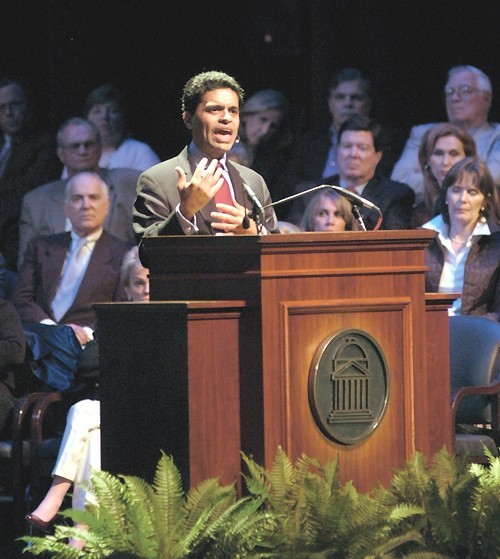
Newsweek editor talks globalization
Fareed Zakaria, editor of Newsweek International, spoke onglobalization in the world and the effects it was having onsocieties, particularly those in the Middle East. The lecture wasthe third lecture of the 2004-05 Willis M. Tate DistinguishedLecture Series.
Zakaria started by speaking on the polarization effect thatpolitics are having on the U.S. He said what worried him about thecountry being polarized is that “we are increasingly in aworld where we have to be more united,” referring toterrorism and other global challenges facing the country.
Next, he gave a brief history of globalization. Zakaria feelsthat in the 1990s, the world took a “holiday fromhistory” by expecting technology and other advances insociety to remain positive.
“The world was becoming like us,” he said.”[Globalization was] a great train, countries were going tohave to get on or be left behind.”
Now, Zakaria says “we see a different world” becausesome negative effects of globalization have been realized.”Wefocused too much on the economic impact of globalization,” hesaid. “We didn’t focus on the politics ofglobalization.
“We didn’t think of human beings being affected byglobalization.”
Because the human element was neglected, Zakaria believes thatglobalization stalled.
“You’ve got to ask yourself: How do I make this workpolitically?” he said.
He also pointed to China, India, Brazil and Thailand ascountries that understand there is a political process toglobalization.
Switching topics to globalization of the Middle East, Zakariasaid that in the 1950s, no one would have believed the Middle Eastto be “problematic.”
“The key to everything,” he said, “is oneword, three letters: oil.”
Zakaria went on to say that Middle Eastern governments gained anexemption from globalizing at the paces of other civilizedsocieties.
Because of the governments generating revenues strictly from oilhe said, the countries were not forced to change.
“It looks like economies are doing well, but they’renot producing anything,” he said.
Unlike western governments where citizens and the governmentexchange taxes for freedom, liberty and democracy, Zakaria saidMiddle Eastern countries such as Saudi Arabia offer their citizens”not taxation, no representation.”
“The Arab world is unique … people are less freethan they were 35 years ago,” Zakaria said. “It’sthe one place in the world where nothing has changed.”
“That is the reality in the Middle East.”
Another problem Zakaria sees in the Middle East is thepopulation of young males, which he believes is a problem in anysociety.
“Seventy percent of the Middle East is under the age of25,” he said.
Zakaria pointed to historical references such as the FrenchRevolution, the Iranian Revolution and the year 1968, when Americawas entrenched in the Vietnam War, as proof that a large populationof young males is directly related to violence in a society.
“The Middle East is going through the biggest youth bulgein recent memory,” he said.
This bulge of young men in the Middle East and the infusion ofreligion into governments in the region promote a”winner-takes-all policy” according to Zakaria.
From there, it transforms into extremism that eventually leadsto terrorism.
Zakaria offered broad solutions to the problem of terrorism inthe Middle East and in the world. “At one level deal withpeople who are trying to kill Americans,” he said.”Find them, capture them and kill them.”
But the broader problem still goes back to the size of the youngmale population.
“How do you stop the global supply chain ofterrorism?” Zakaria said.
According to Zakaria, cutting off the supply chain is moreimportant than dealing with individual terrorists or terroristorganizations.
The solution Zakaria says is to make the young males in MiddleEastern society feel like they are “entering a world thatthey can master and advance in.”
But Zakaria believes that Middle Eastern countries did respondto globalization, just not in the same was as Western society.
For every advance in society courtesy of globalization, otherthings advanced as well such as the technology in bombs.
Also, Zakaria believes that globalization which was thought toencourage harmony actually promoted “envy, hate andanimosity” because poorer countries could see”what’s going on in the world.”
In closing, Zakaria said it was important to convince youngmales in the Middle East that it is “better for [them] tolive than to die.”
Zakaria is currently the editor for Newsweek International. Hiscolumn appears in such publications as Newsweek, NewsweekInternational and The Washington Post. He also offerspolitical analysis on ABC’s “This Week with GeorgeStephanopoulos.”
A native of India, Zakaria received a B.A. degree in historyfrom Yale and a Ph.D. in international relations from Harvard.
He currently resides in New York City with his wife andchildren.








